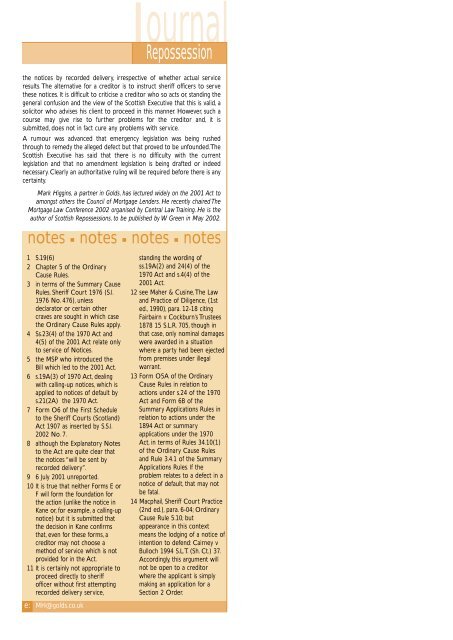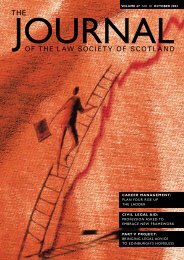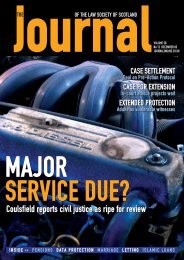OF THE LAW SOCIETY OF SCOTLAND - The Journal Online
OF THE LAW SOCIETY OF SCOTLAND - The Journal Online
OF THE LAW SOCIETY OF SCOTLAND - The Journal Online
You also want an ePaper? Increase the reach of your titles
YUMPU automatically turns print PDFs into web optimized ePapers that Google loves.
e:<br />
MH@golds.co.uk<br />
<strong>Journal</strong><br />
Repossession<br />
the notices by recorded delivery, irrespective of whether actual service<br />
results. <strong>The</strong> alternative for a creditor is to instruct sheriff officers to serve<br />
these notices. It is difficult to criticise a creditor who so acts or, standing the<br />
general confusion and the view of the Scottish Executive that this is valid, a<br />
solicitor who advises his client to proceed in this manner. However, such a<br />
course may give rise to further problems for the creditor and, it is<br />
submitted, does not in fact cure any problems with service.<br />
A rumour was advanced that emergency legislation was being rushed<br />
through to remedy the alleged defect but that proved to be unfounded.<strong>The</strong><br />
Scottish Executive has said that there is no difficulty with the current<br />
legislation and that no amendment legislation is being drafted or indeed<br />
necessary. Clearly an authoritative ruling will be required before there is any<br />
certainty.<br />
Mark Higgins, a partner in Golds, has lectured widely on the 2001 Act to<br />
amongst others the Council of Mortgage Lenders. He recently chaired <strong>The</strong><br />
Mortgage Law Conference 2002 organised by Central Law Training. He is the<br />
author of Scottish Repossessions, to be published by W Green in May 2002.<br />
notes ■ notes ■ notes ■ notes<br />
1 S.19(6)<br />
2 Chapter 5 of the Ordinary<br />
Cause Rules.<br />
3 in terms of the Summary Cause<br />
Rules, Sheriff Court 1976 (S.I.<br />
1976 No. 476), unless<br />
declarator or certain other<br />
craves are sought in which case<br />
the Ordinary Cause Rules apply.<br />
4 Ss.23(4) of the 1970 Act and<br />
4(5) of the 2001 Act relate only<br />
to service of Notices.<br />
5 the MSP who introduced the<br />
Bill which led to the 2001 Act.<br />
6 s.19A(3) of 1970 Act, dealing<br />
with calling-up notices, which is<br />
applied to notices of default by<br />
s.21(2A) the 1970 Act.<br />
7 Form O6 of the First Schedule<br />
to the Sheriff Courts (Scotland)<br />
Act 1907 as inserted by S.S.I.<br />
2002 No. 7.<br />
8 although the Explanatory Notes<br />
to the Act are quite clear that<br />
the notices “will be sent by<br />
recorded delivery”.<br />
9 6 July 2001 unreported.<br />
10 It is true that neither Forms E or<br />
F will form the foundation for<br />
the action (unlike the notice in<br />
Kane or, for example, a calling-up<br />
notice) but it is submitted that<br />
the decision in Kane confirms<br />
that, even for these forms, a<br />
creditor may not choose a<br />
method of service which is not<br />
provided for in the Act.<br />
11 It is certainly not appropriate to<br />
proceed directly to sheriff<br />
officer without first attempting<br />
recorded delivery service,<br />
standing the wording of<br />
ss.19A(2) and 24(4) of the<br />
1970 Act and s.4(4) of the<br />
2001 Act.<br />
12 see Maher & Cusine,<strong>The</strong> Law<br />
and Practice of Diligence, (1st<br />
ed., 1990), para. 12-18 citing<br />
Fairbairn v Cockburn’s Trustees<br />
1878 15 S.L.R. 705, though in<br />
that case, only nominal damages<br />
were awarded in a situation<br />
where a party had been ejected<br />
from premises under illegal<br />
warrant.<br />
13 Form O5A of the Ordinary<br />
Cause Rules in relation to<br />
actions under s.24 of the 1970<br />
Act and Form 6B of the<br />
Summary Applications Rules in<br />
relation to actions under the<br />
1894 Act or summary<br />
applications under the 1970<br />
Act, in terms of Rules 34.10(1)<br />
of the Ordinary Cause Rules<br />
and Rule 3.4.1 of the Summary<br />
Applications Rules. If the<br />
problem relates to a defect in a<br />
notice of default, that may not<br />
be fatal.<br />
14 Macphail, Sheriff Court Practice<br />
(2nd ed.), para. 6-04; Ordinary<br />
Cause Rule 5.10; but<br />
appearance in this context<br />
means the lodging of a notice of<br />
intention to defend: Cairney v<br />
Bulloch 1994 S.L.T. (Sh. Ct.) 37.<br />
Accordingly, this argument will<br />
not be open to a creditor<br />
where the applicant is simply<br />
making an application for a<br />
Section 2 Order.










